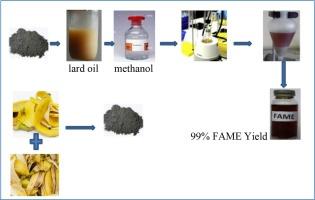Green hetero-alkali catalyst in optimized waste lard oil transesterification for biodiesel synthesis
IF 2.5
Q2 CHEMISTRY, MULTIDISCIPLINARY
引用次数: 0
Abstract
Climate change in addition to the imminent depletion of the fossil fuel reserve has necessitated the search for a sustainable alternative fuel. In this research, the catalytic capability of a green heterogeneous alkali catalyst, thermally activated banana-plantain-peel-ash catalyst was examined in optimized waste lard oil (WLO) transesterification process in lard-oil-methyl-ester (LOME) synthesis. The catalyst was derived from a banana-plantain-peel-ash mixture and subjected to a calcination process while the catalyst properties were described via Scanning electron microscope-Energy dispersive atomic-x-ray-spectroscopy (SEM-EDX), X-ray diffraction-(XRD), Fourier Transform Infra-Red (FTIR) as well as Brunauer-Emmett-Teller (BET). Optimization of the waste lard oil transesterification process was conducted with the Desirability Explore Algorithm (DEA) in Central Composite Design (CCD) of Response Surface Methodology (RSM). A 99.9 % conversion of WLO to LOME was attained at the optimum reaction settings of 57 °C temperature, catalyst amount-2.5 wt%, time-1.5 h, and methanol to WLO molar ratio of 10.5:1 with a total desirability of 0.99 which was evaluated experimentally as 99 %. In the LOME synthesis procedure, the resulting empirical model demonstrated statistical significance and suitability based on its high F-value of 35.59 and infinitesimal p-value of less than 0.0001. The determined LOME fuel qualities met the applicable standard specifications (ASTM-D6751 and EN-14241) hence, have the potential to function as a diesel fuel substitute. The fused influence of WLO and the thermally activated bio-mixture catalyst was highly effective in biodiesel synthesis. Thus; a promising cheap feedstock source for green and sustainable biodiesel production was achieved.

优化废猪油酯交换反应合成生物柴油的绿色杂碱催化剂
气候变化以及化石燃料储备即将枯竭,使得人们有必要寻找一种可持续的替代燃料。本研究考察了一种绿色异相碱催化剂--热活化香蕉-蕉皮-灰催化剂在优化的猪油-甲基酯(LOME)合成中的废猪油(WLO)酯交换过程中的催化能力。催化剂从香蕉-蕉皮-灰混合物中提取,并经过煅烧过程,同时通过扫描电子显微镜-能量色散原子-X 射线光谱(SEM-EDX)、X 射线衍射(XRD)、傅立叶变换红外(FTIR)以及布鲁瑙尔-艾美特-泰勒(BET)分析了催化剂的特性。采用响应面方法学(RSM)的中央复合设计(CCD)中的可取性探索算法(DEA)对废猪油酯交换工艺进行了优化。在温度为 57 °C、催化剂用量为 2.5 wt%、时间为 1.5 h、甲醇与 WLO 的摩尔比为 10.5:1 的最佳反应设置下,WLO 转化为 LOME 的转化率为 99.9%,总可取性为 0.99,实验评估结果为 99%。在 LOME 合成过程中,根据 35.59 的高 F 值和小于 0.0001 的无穷小 P 值,得出的经验模型具有统计意义和适用性。所确定的 LOME 燃料质量符合适用的标准规范(ASTM-D6751 和 EN-14241),因此具有作为柴油燃料替代品的潜力。WLO 和热激活生物混合物催化剂的融合影响在生物柴油合成中非常有效。因此,为绿色和可持续生物柴油生产提供了一种前景广阔的廉价原料来源。
本文章由计算机程序翻译,如有差异,请以英文原文为准。
求助全文
约1分钟内获得全文
求助全文

 求助内容:
求助内容: 应助结果提醒方式:
应助结果提醒方式:


